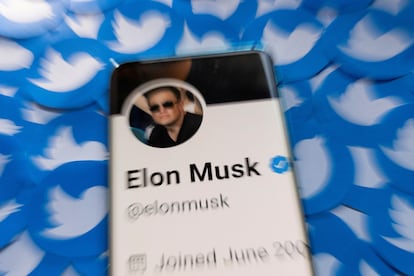Will Elon Musk buy Twitter on Friday?
The world’s richest man has a deadline to complete a deal for the platform and avoid a breach of contract trial, handing him control of the medium on the eve of the US midterms

Three weeks ago, Elon Musk announced that he would buy Twitter, for the agreed price of $54.20 per share, on condition that a trial for breach of contract, at which Musk was called to testify on October 18, be called off. Against all odds and despite the plaintiff’s skepticism (Twitter described the proposal as “an invitation to further delays and pettiness”), the judge agreed to a postponement. If the purchase is not closed before 11pm this Friday, the trial will take place in early November, in front of a magistrate who has had quite enough of Elon Musk.
Musk’s motives are inscrutable even to his closest associates. His text messages, leaked during the court document discovery process, reveal a mercurial man surrounded by sycophants who compete to retain his interest while tolerating his slights. On the day he announced his bid, he declared in an interview that Twitter is the “de facto public town square” and that his intention is to privatize it to free its algorithms because he suffers from a “pathological appreciation for the truth” and wants to guarantee freedom of speech. He then launched a smear campaign against the platform backed by fabricated data, petty accusations and bribed witnesses. The paradoxes keep piling up: why force the purchase of a platform that does not want to be bought, and then publicly denigrate it, lowering its value? Why sign an ironclad contract only to try to break it a moment later? Why propose to pay $46 billion – twice as much as Iceland’s GDP – only to describe it as nonsensical and demand a discount? And now, above all: is Musk really willing to buy Twitter or is this a new ruse to boycott the purchase without having to pay the fine?
One thing is certain: Twitter is an even worse investment now than it was six months ago. The platform continues to suffer from the same pathologies as others such as Meta or YouTube (spam, fake accounts, disinformation and other ingredients that deteriorate public debate) without having a business model that compensates for its reputational crisis. But now, with the tech market in an unprecedented recession, the platform is worth much less than it was, and the Tesla shares that Musk planned to sell to raise his share ($33 billion) are worth less now than they were half a year ago. The banks and private funds that were going to put up the remaining $13 billion could also be getting cold feet about a complicated investment.

Musk’s ventures could face US national security reviews
Two hypothetical escape routes are being considered: the banks could withdraw their support and the authorities can block the acquisition. If the Bank of America, Barclays, or MUFG pull out of financing the project, Musk could cancel his commitment by paying “just” $1 billion in compensation. This option seems very unlikely, though, and has not been corroborated by any bank or investor. The second route concerns an exclusive that Bloomberg published last Friday, according to which “Biden administration officials are discussing whether the US should subject some of Elon Musk’s ventures to national security reviews, including the deal for Twitter Inc. and SpaceX’s Starlink satellite network.” According to anonymous sources from the newspaper, the US government is suspicious of the non-US investors that Musk has sought in China and of his recent sympathy toward Vladimir Putin. When asked about the issue, White House spokeswoman Adrienne Watson replied: “We are not aware of that debate.” It seems more likely that the purchase will take place.
Musk himself has also altered his discourse of saving the public town square for another slightly more credible one. “Buying Twitter is an accelerant to creating X, the everything app,” he said after resuming his bid to acquire the platform. It makes sense that he would want to replicate the model of WeChat, the platform of Chinese giant Tencent Holdings, which centralizes the lives of Chinese citizens from messaging and social networking to payments, health cards, interaction with public utility companies and streaming music and movies. It would be strongly compatible with Musk’s satellite-connected Starlink project and it makes sense for banks to want to finance it, taking into account its potential. WeChat is also the key to China’s social credit system, a national credit rating by which citizens gain and lose access to services, opportunities, and the ability to work or travel depending on their activities and communications.
In short, it seems very likely that Elon Musk will buy Twitter this Friday. If he does, the billionaire will have complete control over one of the most important spaces for contemporary political communication on the eve of the US legislative elections, where it will be decided which party controls Congress. He will make the decision behind closed doors, with partners such as venture capital firm Andreessen Horowitz and Larry Ellison, the Oracle CEO to whom Donald Trump wanted to make a gift of TikTok. Prince Alwaleed bin Talal Al Saud of Saudi Arabia, Qatar and cryptocurrency exchange Binance will also be involved. At the same time Musk’s best friend, the musician Kanye West, is in the process of acquiring Parler, the social network that became the refuge of the American far right when the major platforms banned Trump. “In a world where conservative opinions are considered to be controversial we have to make sure we have the right to freely express ourselves,” West said.
Musk has already announced that he will lay off 75% of Twitter’s workforce, including its CEO. There will be no one left to moderate messages about the illegitimacy of the presidential elections or Joe Biden’s satanic club in Romania. Musk recently tweeted the famous scene from The Godfather: Part III in which Michael Corleone says: “Just when I thought I was out, they pull me back in.”
Tu suscripción se está usando en otro dispositivo
¿Quieres añadir otro usuario a tu suscripción?
Si continúas leyendo en este dispositivo, no se podrá leer en el otro.
FlechaTu suscripción se está usando en otro dispositivo y solo puedes acceder a EL PAÍS desde un dispositivo a la vez.
Si quieres compartir tu cuenta, cambia tu suscripción a la modalidad Premium, así podrás añadir otro usuario. Cada uno accederá con su propia cuenta de email, lo que os permitirá personalizar vuestra experiencia en EL PAÍS.
¿Tienes una suscripción de empresa? Accede aquí para contratar más cuentas.
En el caso de no saber quién está usando tu cuenta, te recomendamos cambiar tu contraseña aquí.
Si decides continuar compartiendo tu cuenta, este mensaje se mostrará en tu dispositivo y en el de la otra persona que está usando tu cuenta de forma indefinida, afectando a tu experiencia de lectura. Puedes consultar aquí los términos y condiciones de la suscripción digital.









































